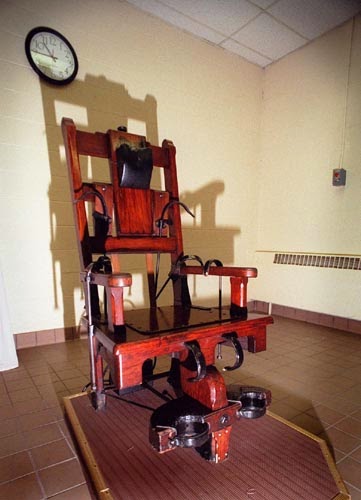 |
Electric chair at Southern
Ohio Correctional Facility |
The difficulty of obtaining drugs for executions has some Ohio legislators talking about alternatives, including the electric chair.
"There are other options," said Rep. Jim Buchy, R-Greenville, a co-sponsor of legislation to keep the supplier of execution drugs secret.
"Rope is cheap," said state Sen. Bill Seitz, R-Cincinnati.
No one is seriously suggesting - at least not yet - taking "Old Sparky," Ohio's electric chair, out of retirement, or returning to hanging, which the state abandoned in 1897.
But Ohio's problem with lethal-injection drugs is coming to a head: The scheduled Feb. 15 execution of Ronald Phillips is 90 days away.
Legislators are rushing to pass House Bill 663 before the lame-duck legislative session ends on Dec. 31 so that the Ohio Department of Rehabilitation and Correction can obtain drugs it needs at least a month before the execution. The legislation would protect the identity of the source of the drugs from disclosure to the public and news media, and allow physicians who participate in the process - as well as execution-team members - to remain anonymous.
The deadline is crucial because the state must inform U.S. District Judge Gregory Frost of any changes in the execution protocol, including use of new or different drugs, 30 days before a scheduled execution. Frost, the judge handling lethal-injection lawsuits filed by death row inmates, postponed executions this year until the drug issue is resolved.
Ohio's most-recent execution, of Dennis McGuire on Jan. 16, was troubled. After the injection of midazolam and hydromorphone into his veins, McGuire struggled against the restraints around his body for about 20 minutes. He repeatedly gasped for air, made snorting and choking sounds and clenched his hands into fists.
That combination of drugs had never been used in the U.S., and, if Ohio prisons director Gary Mohr has his way, will never be used again in Ohio. The state had resorted to the untested combination when pentobarbital, the single drug used previously, became unavailable because manufacturers no longer sold it for use in executions.
The drug still can't be obtained except from small "compounding pharmacies" that mix drugs to customer specifications.
Ohio House Speaker William Batchelder, R-Medina, said the issue can't wait, "or we're going to have people pass away prior to execution."
If Ohio were to revert to the electric chair, it would not be the 1st state to do so. Tennessee passed a law this year requiring electrocution if lethal-injection drugs aren't available. Tennessee also enacted a law last year shielding the source of execution drugs from public disclosure.
The Death Penalty Information Center, a nonpartisan capital-punishment clearinghouse, says 8 states allow electrocutions, but most of them don't use it.
In addition, Arizona, Missouri and Wyoming allow the gas chamber, Delaware, New Hampshire and Washington permit hanging, while Oklahoma and Utah allow the firing squad under limited circumstances.
Even if Ohio would, like Tennessee, go back to electrocutions, there's a problem: Old Sparky was unplugged and shipped in 2002 to what is now the Ohio History Connection. It was the focal point of a 2011 exhibition, "Controversy: Pieces You Don't Normally See," that attracted thousands of visitors to the museum at 17th Street and I-71. The wood, metal and leather chair was used to execute 312 men and 3 women between 1897 and 1963.
It is now in storage.
Lethal injection, by law, became the only means of execution in Ohio in 2001. However, that doesn't rule out other execution methods being added. There have been discussions of options, including a gas administered by a mask fitted over the face.
Richard Dieter, executive director of the Death Penalty Information Center, said Missouri, Georgia and Texas have, like Tennessee, passed laws or have by administrative rule cloaked the source of lethal-injection drugs. Georgia made it a crime to reveal the drugs or their source.
Dieter said he's uncomfortable with a system that hides vital information from the public about government's ultimate power of life and death.
"This is a curious path to go down. States would be better off being more upfront about this.
"The fundamental principle is about how government is kept in check by the people knowing what government is doing. ... It makes a difference where the drugs come from, just as it would make a difference where the bolts come from in bridges that the state builds."
Dieter said he is unaware of pharmacies or drug suppliers being harassed or threatened, something suggested in the Ohio proposal as the rationale for confidentiality. But there have been issues. A Houston pharmacy stopped selling execution drugs when it was publicly revealed as a supplier. A Missouri pharmacy that sold drugs to Oklahoma was sued for allegedly violating a prohibition against interstate sale of drugs.
The American Civil Liberties Union of Ohio slammed the legislation. "It's not only a bad idea, it is bad governance to ram through during a postelection session without due and serious consideration," said Mike Brickner, ACLU senior policy analyst.
The Ohio Newspaper Association is opposed to making secret the records of execution drugs. In a column, association Executive Director Dennis Hetzel said he was "shocked by the sweeping language and the overall tone" of the legislation.
"Under the current language, it will be impossible for journalists, citizens, families and anyone else outside a handful of government officials and bureaucrats to scrutinize the process. The new, open-ended exception will invite the courts to block access to more and more information."
Source: Columbus Dispatch, November 17, 2014










